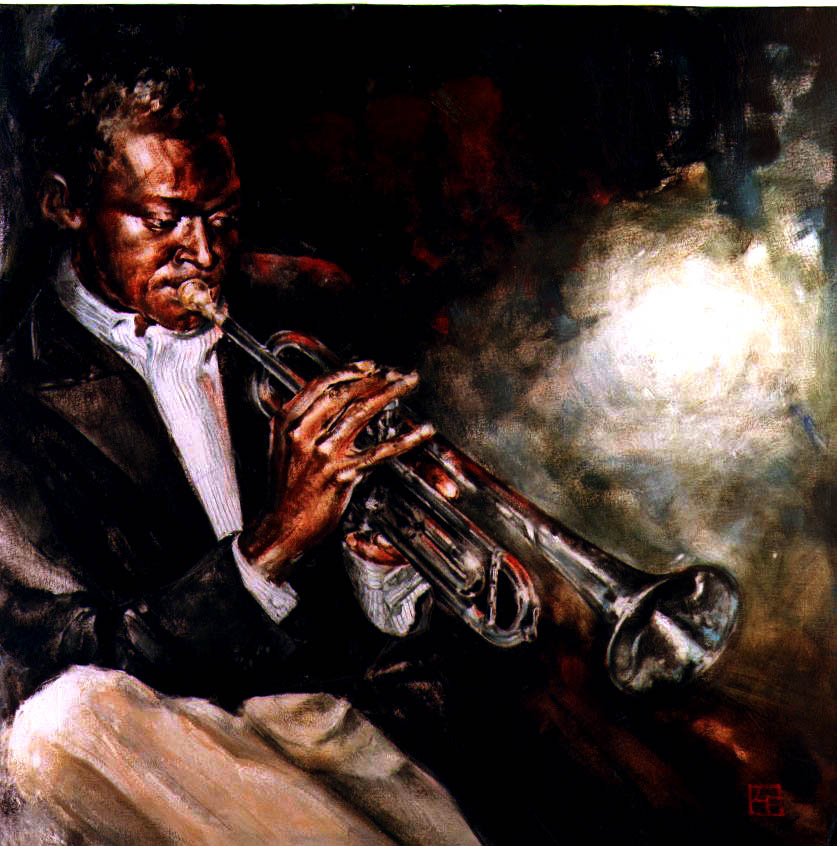|
February 12, 2006
This interpretation of the work of Miles Davis by Brian Eno is courtesy of Josef K over at Different Maps. It was orginally published in The Wire, December/Jan 1993.

Luisa Fuster
Miles Davis is known, and clebrated as, the great innovator who knew his roots inside out. Some of his ground b reaking music music is interpreted as the 'stuff of legend ' as milestones (eg, Birth of the Cool or Kind of Blue or Bitches Brew). He has been compared to Picasso, in relation to constant musical reinventions---bebop in the 1940's), to cool jazz to so-called modal jazz (abandoning traditional chord changes for improvisations based on modal scales), to the fusion music (jazz-rock and jazz-funk, )to layered recordings built up from edited tracks, to open-ended explorations of roiling, murky sonic textures. Davis is also seen as a wasted talent, selling out to rock and electronics in a pitiful, desperate effort to remain forever young, and a celebratory who engaged in his drug use and pimp posings.
Eno says:
'When you listen to Miles Davis, how much of what you hear is music, and how much is context? Another way of saying that is, 'What would you be hearing if you didn't know you were listening to Miles Davis?' I think of context as everything that isn't physically contained in the grooves of the record, and in his case that seems quite a lot. It includes your knowledge, first of all, that everyone else says he's great: that must modify the way you hear him. But it also includes a host of other strands: that he was a handsome and imposing man, a member of a romantic minority, that he played with Charlie Parker, that he spans generations, that he underwent various addictions, that he married Cicely Tyson, that he dressed well, that Jean-Luc Godard liked him, that he wore shades and was very cool, that he himself said little about his work, and so on. Surely all that affects how you hear him: I mean, could it possibly have felt the same if he'd been an overweight heating engineer from Oslo? When you listen to music, Aren't you also 'listening' to all the stuff around it, too? How important is that to the experience you' re having, and is it differently important with different musics, different artists?
Miles was an intelligent man, by all accounts, and must have become increasingly aware of the power of his personal charisma, especially in the later years as he watched his reputation grow over his declining trumpeting skills. Perhaps he said to himself: 'These people are hearing a lot more context than music, so perhaps I accept that I am now primarily a context maker. My art is not just what comes out of the end of my trumpet or appears on a record, but a larger experience which is intimately connected to who I appear to be, to my life and charisma, to the Miles Davis story." In that scenario, the 'music', the sonic bit, could end up being quite a small part of the whole experience. Developing the context- the package, the delivery system, the buzz, the spin, the story - might itself become the art. Like perfume...
Professional critics in particular find such suggestions objectionable. They have invested heavily in the idea that music itself offers intrinsic, objective, self contained criteria that allow you to make judgments of worthiness. In the pursuit of True Value and other things with capital letters, they reject as immoral the idea that an artist could be 'manipulative' in this way. It seems to them cynical: they want to believe: to be certain that this was The Truth, a pure expression of spirit wrought in sound. They want it to 'out there', 'real', but now they're getting the message that what its worth is sort of connected with how much they're prepared to take part in the fabrication of a story about it. Awful! To discover that you're actually a co-conspirator in the creation of value, caught in the act of make-believe. 'How can it be worth anything if I did it myself?'
I remember seeing a thing on TV years ago. An Indonesian shaman was treating sick people by apparently reaching into their bodies and pulling out bloody rags which he claimed were the cause of their disease. It all took place in dim light, in smoky huts, after intense incantations. A Western team filmed him with infrared cameras and, of course, were able to show that he was performing a conjuring trick. He wasn't taking anything out of their bodies after all. So he was a fake, no? Well, maybe-- but his patients kept getting better. He was healing by context-- making a psychological space where people somehow got themselves well. The rag was just a prop. Was Miles, with a trumpet as a prop, making a place where we, in our collective imaginations, could somehow have great musical experiences? I think so. Thanks, Miles, and thanks everyone else who took part, too. '
This does away with absolute values in art, understandable from a creator of ambient music, which investigated the potential of making music as an integral part of the listener’s aural landscape. Josek K questions the way Eno draws an analogy between Miles Davis and the Shaman.
Could not the figure of the Shaman stand for a non-instrumental coinception of music --an alternative to music as product? I'm thinking of Adorno and Horrjheimers use of the Shaman in their Dialectic of Enlightenment--I don't have the text with me.
|

quite inspiring stuff here..
i decided to make an effort to mix miles davis and eno, or jazz in a process of redevelopment with ambient 'contextual'(?) music...
If i succeed i'll play it in my radio show @ www.lsrfm.com
i'll let you know ;-)